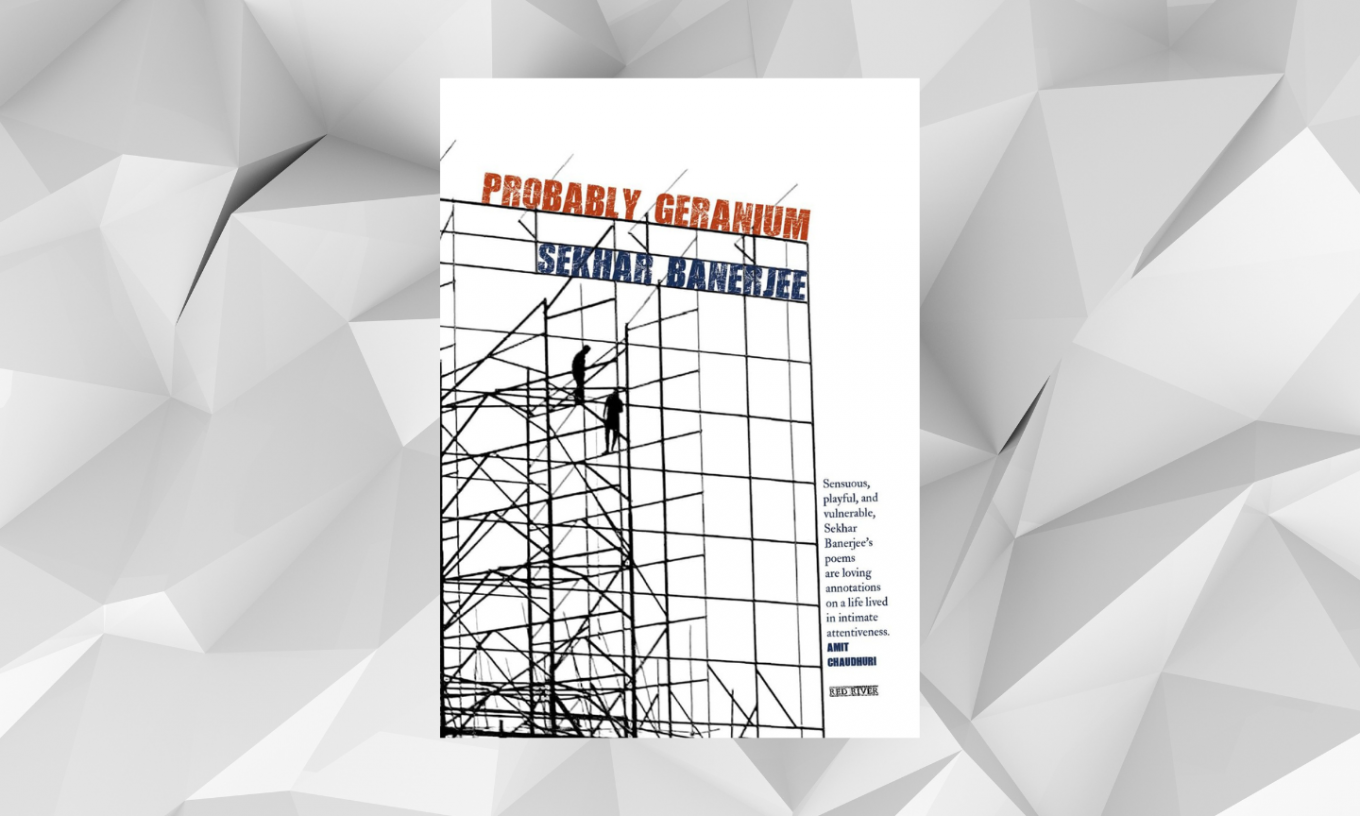Title: Probably Geranium
Author: Shekhar Banerjee
Publisher: Red River
Year of Publication: 2024
Probably Geranium begins with a curious cover picture. The silhouette of two men, standing high up against a sky, on what looks like an advertisement banner framework. If you’re poetically inclined, you might even think that these are men observing a city from a height. But observation rarely needs one to climb heights, and who better to tell us that than poet Shekhar Banerjee, who’s book of poems it is.
In a rather old-fashioned manner, I like mulling over a book, carrying it around me. Observing it, scribbling on it, sensing words and phrases jump out at me, as much as the book seems to adapt to how I live the words, read and interpret them..and so it is with this one too.
Most poets travel, in this book Banerjee travels laterally and outwardly too. But there is a stillness to this travel, it is as if the poet were having a quiet conversation with everything he sees, and tucks away within himself, a reaction for posterity. Reading the poems, one is flung into mysterious lakes, foggy mornings, small Chinese restaurants, or quiet corners in a busy city street. Travel becomes an escape, and observation a startling deviation from the humdrum life that we all lead.
‘The evening in the hills looks like muddy water,
without sound.
Evenings are worse than their silence.
They wait for something more ordinary
or far darker, a kind of insipidness
that usually seeps through an old tea bag’
Like mist in the hills, the mood changes quickly. The poet is alert and receptive to leaves on the ground beneath which he walks, to light, to bird calls, a stir and everything in between. Nature is his comfort zone, and the rolling hills a sanctuary.
Rain massages memories
and scalp; forest floors consume the sky,
dead leaves,
and abruptly sigh belladonna and zinc.
One becomes aware of a masked gaze when within the city limits though. He walks cautiously, slowly, even hesitantly, a slow study as he treads through. But like the eternally curious, the poet travels along nights and days of the eclectic city he lives in too, and there’s very little that he misses in between.
‘My shadow and I compose poems,
conduct scientific experiments,
translate great literary works, write plays,
sing elegiac songs
and discuss political thoughts without words
at noonday
in a closed room, in a closed earth..’
OR
‘An old man mutters something in Chinese
and coughs in no language
from Kim Fa, a century old restaurant with a glass door
and an iron gate, red..’
And then you come upon poems when he is in Bhutan, Benares or the rolling hills of tea estates, and suddenly there opens a sea of emotions, folding inward like a faulty umbrella, harbouring on the vulnerability of being swept away in that old feeling of homecoming. His poet’s eyes follow him everywhere, the romantic in him makes an appearance more here than elsewhere. It pours when it rains, vulnerability suddenly a gossamer thread on a misty morning, and the world becomes a green rivulet with the laughter of spring again.
The thick forest just above the shoulder
of the north Bhutan hills
is a wide bluish comforter around its neck.
It is a muddled artwork
in the early morning.
Banerjee’s poems are deeply introspective, mulling over microbes floating in the sunlight and mulching over the imagined grotesque smell of dogs taking shelter in tanneries in Chinatown. The city of Calcutta/Kolkata becomes his playground, his footprint on it undeniable. Vulnerability becomes him, like a caress on a deeply heated political Indian summer. His thoughts lie divided between the lines and the stunning photographs that are shot by him, scattered throughout the book, adding dimension.
There are few scattered abrupt tail ends, ones that you wish were better sewn..and then an abrupt flash of brilliance. Like the most interesting of walks, this is a plate full of sunlight and shadows. Tread where you will.
One leaves these pages with the thought that here is a voice to look out for, a confident, assured tread, this.





